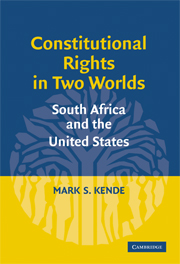3 - The Death Penalty
Published online by Cambridge University Press: 25 July 2009
Summary
South Africa has disallowed capital punishment for more than a decade, yet violent crime there remains newsworthy even internationally. The crime rate is among the highest in the world. In 2000, a man broke into South African President Thabo Mbeki's house, despite heavy security, and made himself comfortable drinking brandy for several days while Mbeki was out of the country. During my year in South Africa as a Fulbright scholar in 2000, I was told about a man who began a walk across the country to bring national media attention to the high crime rate. Robbers supposedly mugged him on the first day.
Despite evidence that many South Africans favored the death penalty, the new South African Constitutional Court in 1995 ruled the death penalty unconstitutional in State v. Makwanyane & Another (Makwanyane). The Court's president, Arthur Chaskalson, authored the unanimous opinion, though all of the other Justices wrote separate concurrences. The national government supported the challengers because the government was made up of former apartheid opponents who had risked execution. An attorney general (AG) from one of South Africa's provinces defended the law. The decision contrasts sharply with the U.S. Supreme Court's 1976 landmark ruling in Gregg v. Georgia upholding the death penalty's constitutionality.
- Type
- Chapter
- Information
- Constitutional Rights in Two WorldsSouth Africa and the United States, pp. 52 - 90Publisher: Cambridge University PressPrint publication year: 2009

